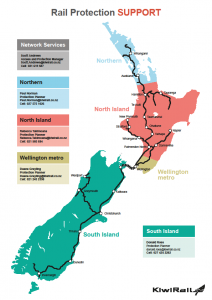From the Chair
At the recent NZUAG AGM, I noted that the Board had been active on behalf of members during the 2016/17 year, focusing on two key areas: Code education and Code compliance. We farewelled some long standing Board members, including Peter Gilbert as Gas Sector representative and Chair of the Finance Committee, and welcomed new ones. We maintained regular contact with the sector through our quarterly newsletter, and once again our finances were managed well. We are now in a very strong position to conduct the major Code review next year, and we will be working hard to ensure as many people as possible have the opportunity to take part in the process to improve the Code that is so vital for our economic development. The Annual report can be found here.
Please keep an eye out for more Code review details over the coming months.
On behalf of the Board, I’d like to wish you a safe and restful Christmas and New Year, and I look forward to working with you in 2018.
Regards,
Paul Swain
Chair, NZUAG
Changes around the Board Table
NZUAG is governed by a 10 member board, made up of equal numbers of Transport Corridor Managers and Utility Sector Operators. The appointments process and succession arrangements are laid out in our rules, with members serving a two year term. This year’s AGM saw the following representation positions up for nomination:
– Government Roads Sector
– LGNZ Major TLA
– Road Controlling Authorities
– Telecommunications Sector
– Gas Sector
– 5th Utility Operator’s position
As a result of representation changes, Rene D’Ath replaces Peter Gilbert as Gas Sector representative. Al Christ, Major TLA representative from Auckland Transport announced that due to changes in his work roles, he will in future be replaced by Laurence Jones. Ian Cox (Government Roads Sector), Brett North (Road Controlling Authorities), Geoff Thorn (Telecommunications Sector) and Nick Miskelly (5th Utility Operator) were reappointed.
The full Board is as follows:
| Person | Organisation | Nominating Body | Sector Represented |
| Ross Malcolm | Vector | ENA and EEA | Electricity |
| Geoff Thorn | NZ Telecommunications Forum | NZ TCF | Telecommunications |
| Tony Hale | Waipa District Council | Water NZ | Water |
| Rene D’Ath | GANZ Board | GANZ | Gas |
| Nick Miskelly | Chorus | Electricity, Gas, Water and Telecommunications sector representatives | 5th Utility Operator’s position |
| Ian Cox | NZTA | NZTA | Government Roads |
| Scott Andrews | KiwiRail | KiwiRail | National Rail Manager |
| Brett North | Wellington City Council | RCA Forum | Road Controlling Authorities |
| Phil Consedine | Tauranga City Council | LGNZ | Smaller TLA’s |
| Laurence Jones | Auckland Transport | LGNZ | Major TLA’s |
| Paul Swain | Independent Chair |
2018 Code Review and Seminar Series
Our Code Review Committee has developed a plan and schedule for conducting the next review of the National Code of Practice for Utility Operators’ Access to Transport Corridors through 2018. The review will consist of two stages of consultation and submission, similar to the process used to undertake the first review of the Code in 2014. The first submission round will be launched at the 2018 RIMS conference in Palmerston North in March. A nationwide series of seminars will follow, to run in parallel with the Code Review process. The aim of the seminars will again be to raise awareness of the Code, and to promote engagement with the Code Review process. The seminars will be held in several centres across the country, and will be complimented with webinar type sessions so that those who cannot make it to the seminars can participate.
RIMS Forum 2018
RIMS 2018 is the most important forum for all involved in the Corridor Management space. The Code Review launch will be supported by speakers on topics as diverse as reinstatement issues from the deep south to the heavy haulage industry. We will also report on the results of the survey of compliance that is required under the Code. We look forward meeting as many of you as possible in March 2018 at Palmerston North.
2017 KPI’s Data Collection
Initial results from the 2017 KPI data collection exercise were reviewed by the Board at its November meeting. Response rates are well up on those of the inaugural data collection exercise in 2016, with 36 Corridor Managers and 38 Utility Operators submitting results, representing 46% and 88% response rates respectively. Further analysis of the data is required before we can report to the industry and the Minister. One of the advantages of such an exercise is the ability it provides to start tracking changes over time, with this year’s data hopefully providing a useful benchmark for the future. The Board confirmed its intention to include a full list of respondents and non-respondents in the report that will be sent to the Minister for Infrastructure, as part of the KPI reporting requirements under the National Code of Practice and the Utilities Access Act 2010. If you weren’t able to respond to the survey for some reason please contact the NZUAG Administrator on admin@nzuag.org.nz.

KiwiRail Site Access Changes Changes The KiwiRail Transport Corridor is becoming more frequently used by 3rd party contractors and utility operators. With an increase in infrastructure projects such as cycle ways KiwiRail’s CAR numbers are growing year round. KiwiRail understands the importance of access to rail corridor so it will be implementing smart CAR forms to improve application accuracy, faster turnaround times and be more user friendly. KiwiRail is also looking into introducing a real-time app that will show what permits are currently live.
KiwiRail has employed 4 new planners to help manage CAR applications with a primary focus of improving the monitoring of 3rd parties in the rail corridor. This will mean having one point of contact for each area which will help enforce the requirements of the Code. See the map for details. The new corridor manager is Scott Andrews who has taken over from Greg Hackett.
It is a requirement that all staff coming into the rail corridor have a rail competency. KiwiRail is currently trialling e-learning for their basic training courses. This will be similar to the ConstructSafe framework. It will enable contractors to do their training remotely with waiting times for training reducing. KiwiRail looks forward to catering to more parties in 2018. For any queries regarding access to the rail corridor please email us at the National Permit Office npo1111@kiwirail.co.nz
Before U dig Presentation
Phil Cornforth, from Before-U-Dig, provided an overview of the range of tools they provide for users of their system along with a summary of usage trends. Before-U-Dig operates as a subscription-based organisation providing utility location information on request and notifications to members about the locations of possible works.
One difference between NZ and some other jurisdictions is the reporting of 3rd party damage incidents, with compulsory reporting required in the USA, along with a system of fines for non-compliance. Such requirements have resulted in robust training for locators, as opposed to the more informal approach taken in NZ.
One new initiative is the trial of a locator certification process for NZ. This employs a mix of on-line self-assessment and theory tests, followed by a one-on-one practical assessment. A pilot programme with a number of locators shows merit in introducing such a system on a broader basis. One barrier to this is the current lack of any location standard in NZ. There is the possibility of adding on to the existing Australian Standard AS 5488 to become a joint AS/NZ Standard, but this requires at least two organisations willing to support such a call, including participation in a review committee. This led to discussion as to what role NZUAG sees itself in having in relation to Location Industry training. One of the concerns about the current Australian Standard is that it has provisions that are inconsistent with the NZUAG National Code of Practice so it is unlikely that it can be adopted wholesale. It was agreed that the Board would discuss this issue further at the February 2018 Board meeting.
Board Working Groups
The Code Compliance and Enforcement Committee is currently analysing the compliance data, in order to prepare a summary for circulation back to industry and a report to the Minister for Infrastructure.
The Code Education Committee is developing the education programme to be delivered as an integral part of the Code Review with the aim of increasing the participation in the review process.
The Code Review Committee is working on plans for the 2018 review of the National Code of Practice, and integrating this with the proposed education seminar series. A finalised project plan will be presented to the Board for final sign-off at its February 2018 meeting so that it can be launched at the RIMS Conference.
The Constitutional Review Committee has been re-established to provide options around clarifying membership requirements for organisations listed in the Constitution as nominators of representatives for Board membership. At issue is the lack of clarity around whether such organisations need to maintain Full Membership or can just be Associate Members. The Committee has been tasked with reporting back in time for any required amendments to the Constitution ready for presentation to the 2018 AGM for adoption.
Work on redesigning the NZUAG website ready for migration to a new platform remains the key focus of the Website Review Committee. The intention is to provide greater opportunities for interaction with industry members, as well as making the site more user-friendly and easier to update and maintain.
NZUAG News is published regularly to assist in keeping Industry members and stakeholders informed of NZUAG activities relating to improving knowledge and application of the National Code of Practice for Utilities Access to Transport Corridors.
Your feedback and comment on any of the matters raised in the Newsletter are welcomed, as part of a process of ongoing industry dialogue.
